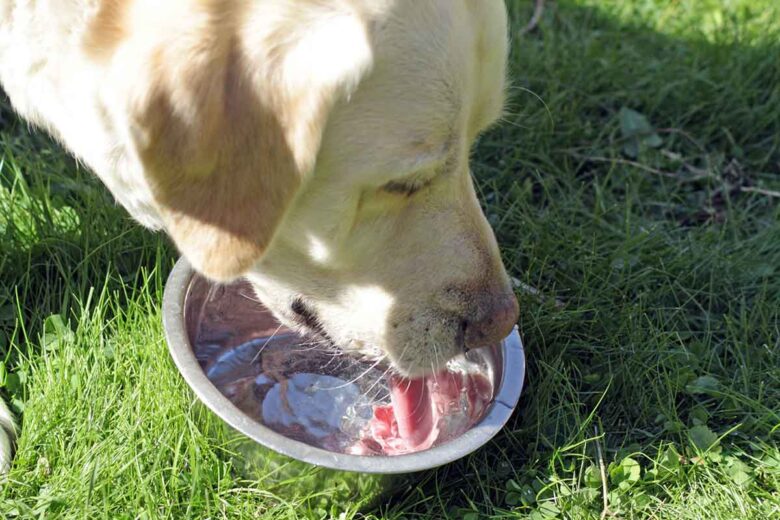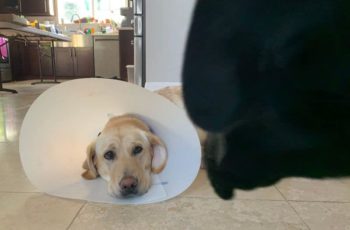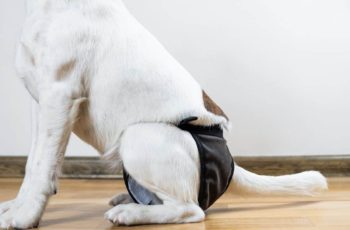This post may contain affiliate links. We may earn money or products from the companies mentioned in this post.
Olds dogs have a special place in our hearts because they have grown old with us, which is why it’s so distressing when their behavior suddenly changes.
A common question pup parents ask is: why is my old dog drinking so much water?
In most of these cases, your dog is okay, and their sudden need for more water is because of simple things that aren’t a cause for alarm, such as it being a hot day, they’ve been very active, or they’ve eaten something that has made them very thirsty.
However, if your dog starts drinking an excessive amount of water over a number of days, then there may be cause for concern.
There are a number of common causes that are linked to old age in dogs that cause excessive thirst, such as kidney failure or disease, Cushing’s disease, diabetes insipidus and mellitus, and dehydration.
Read on to find out more about why old dogs drink so much water, also known as polydipsia, when to be worried and take them to the vet, and the reasons why they may be suffering from these issues.

DISCLAIMER: We are not veterinarians. This article is for entertainment purposes only. If your dog is experiencing health issues please contact your veterinarian.
Contents & Quick Navigation
Reasons Why Healthy Dogs Drink A Lot Of Water
All dogs need water regardless of how old they are, from puppyhood to old age. The amount of water they need on a daily basis will change depending on a lot of factors, such as:
- The weather
- The length or thickness of their coats
- How active they have been
- Their diet
This means if you see your dog drinking all the water in their bowl on a specific day, they are probably simply experiencing one of these very normal factors that can cause them to need a little more hydration in their body.
If you are very concerned about this or their thirst seems abnormally excessive for several days:
- Check the temperature for the day and put down some wet towels for your dog to lay on
- Brush your dog every day with a brush and a metal comb to get rid of compacted undercoat or loose shed
- Keep their exercise time limited to 20 minutes at a time during cooler portions of the day
- If they only eat dry kibble, add some gravy or water mixed in with their food
Reasons Why Unhealthy Dogs Drink A Lot Of Water
If you notice your old dog is drinking a lot more water than they normally do, then it may be an indication that something is wrong with their health.
A symptom that commonly accompanies excessive thirst is loss of bladder control and making messes in the house.
The following issues are common in older dogs and cause them to drink an excessive amount of water.
1. Kidney Disease Or Failure
The kidneys are the organs that filter the blood of impurities and excess water. As dogs age, they may suffer from kidney failure because their bodies are getting older and not working as well as they used to.
Kidney failure may also be caused by a chronic lack of water or an imbalance in their sodium and calcium intake in their diet.
Old dogs are also susceptible to urinary tract infections because of their lowered immune systems. If left untreated, a urinary tract infection can make its way into the kidneys and cause kidney disease.
Kidney disease causes frequent urination and increased thirst, which leads to your old dog drinking a huge amount of water over an extended period of time.
2. Cushing Disease
Cushing’s disease is fairly common in dogs who have struggled with trauma or accidents or have gone through many surgeries.
This is because Cushing’s disease affects the adrenal glands, which produce adrenaline and cortisol.
In cases where trauma has happened, an accident has happened, or your old dog has undergone many surgeries, their adrenal glands can become overworked or shocked.
A tumor may start growing on one of both of the adrenal glands of the pituitary gland. This can cause an imbalance in their cortisol, also known as the stress hormone.
Too much cortisol in the body can cause excessive urination and thirst. Cushing’s disease can be treated with medication to suppress cortisol production or surgery to remove the tumor.
3. Diabetes Mellitus
Diabetes mellitus includes both type 1 and type 2 diabetes; dogs can suffer from both.
Type 1 diabetes is caused by the pancreas’ inability to produce insulin. Insulin acts as a key and unlocks the cells to let sugar in from the bloodstream.
If there is excess sugar in the bloodstream because the body is not supplying insulin, then it can cause an array of problems.
Old dogs suffering from type 1 diabetes will urinate often and need to drink an incredible amount of water because they will feel very thirsty due to the amount of sugar in their bloodstream.
Type 1 diabetes is usually caused by a viral infection, which triggers an autoimmune response, or the dog will have a genetic predisposition to the condition.
On the other hand, type 2 diabetes is caused by insulin resistance. Dogs who are overweight and underactive are highly at risk for developing type 2 diabetes.
Old dogs suffer from this disease because they become inactive as they age and start putting on excess weight.
Insulin resistance means your dog’s body is producing insulin, but the cells no longer recognize it, which leads to an excess of sugar in the bloodstream.
Both types of diabetes can be treated with medication to ease your dog’s thirst.
4. Diabetes Insipidus
Even though “diabetes” is in the name, diabetes insipidus has nothing to do with blood sugar levels like diabetes mellitus.
Diabetes insipidus occurs when there is a problem with producing or storing vasopressin, which is an antidiuretic hormone.
Antidiuretic hormones restrict the amount of water filtered out of the body by the kidneys to help balance the salt to water ratio in the body.
If your old dog has problems with hormone control, specifically vasopressin, then they may have diabetes insipidus.
Diabetes insipidus means the kidneys are filtering out too much water from the system, which results in constant urination and extreme thirst.
5. Other Reasons Why Your Old Dog May Be Drinking So Much Water
There are many illnesses, lifestyle problems, and diseases that can cause polydipsia.
If you notice your dog constantly drinking water and then urinating more frequently over the course of more than two days, it is time to take them to the vet.
Other reasons why your old pup may be drinking excessively include:
- Dehydration
- Liver disease
- Fever from an infection
- Parasites
- Vomiting from illness or eating something strange
- Hyperthermia
One More Reason Why Your Dog Is Drinking A Lot Of Water
I didn’t know if this one should be classified under healthy or unhealthy, so I created it’s on category.
When my black Lab, Stetson was having allergy issues our veterinarian prescribed prednisone.
The good news is the prednisone helped to clear up his skin allergies.
The bad news is he started drinking a ton of water and even began having accidents in the house (he hadn’t had an accident for years).
From our own personal experience, medication caused our old dog to drink too much water.
FAQs About Why Old Dogs Drink So Much Water…
How much water should my dog drink?
Your dog should drink around once fluid ounce of water for every pound of weight. This means if your dog is 12 pounds, they should drink 12 ounces of water for the day.
However, if your dog is very active, they should drink more to ensure they are properly hydrated.
Why do old dogs suffer from problems that cause them to drink so much water?
As dogs age, their bodies stop working as well as they did in puppyhood. Their organs malfunction, get clogged, or cannot produce the same hormones in the right amounts.
An elderly dog’s immune system does not always function well and cannot fight against nasty bacteria and viruses, which make them ill and can cause polydipsia.
Can medications cause excessive thirst in older dogs?
Some medications have excessive thirst as a side effect because they are diuretics or cause frequent urination.
This side effect can be fairly serious, and your vet should insist on blood tests every couple of months to check your dog’s kidney functions to make sure the extra water isn’t causing unnecessary strain.
Barking Off On Why Old Dogs Drink So Much Water
Many owners become very concerned when their old dogs start drinking more water than usual.
Sometimes, this is merely an indication they have played too hard or for too long, and they will recover just fine with a bit of extra water.
However, in some cases, excessive thirst is an indicator something is very wrong with your old dog’s body.
To sum up, your senior dog may be drinking a lot of water because:
- The weather is very hot
- The length or thickness of their coats is causing them to overheat
- They have been especially active that day
- Their diet is very dry
However, their excessive thirst may also be due to serious illness which will require a vet visit, e.g.:
- Kidney failure or disease
- Cushing’s disease
- Type 1 or type 2 diabetes
- Diabetes insipidus
- Infection
- Parasite overload
- Liver failure
- Hyperthermia
- Dehydration
If the excessive thirst lasts longer than two days, your old dog should be seen by a vet where they will run blood tests and do a physical exam to diagnose or rule out any health issues.
Save To Pinterest

Top Picks For Our Dogs
- BEST PUPPY TOY
We Like: Calmeroos Puppy Toy w/ Heartbeat and Heat Packs – Perfect for new puppies. Helps ease anxiety in their new home. - BEST DOG CHEW
We Like: Bones & Chews Bully Sticks – All of our puppies love to bite, nip, and chew. We love using Bully Sticks to help divert these unwanted behaviors. - BEST DOG TREATS
We Like: Crazy Dog Train Me Treats – One of our favorite treats for training our service dog puppies. - BEST FRESH DOG FOOD
We Like: The Farmer’s Dog – A couple months ago we started feeding Raven fresh dog food and she loves it! Get 50% off your first order of The Farmer’s Dog.
For a list of all the supplies we get for our new service dog puppies check out our New Puppy Checklist on the PuppyInTraining.com blog.
Why Is My Old Dog Drinking So Much Water? was last modified: March 9th, 2023 by


